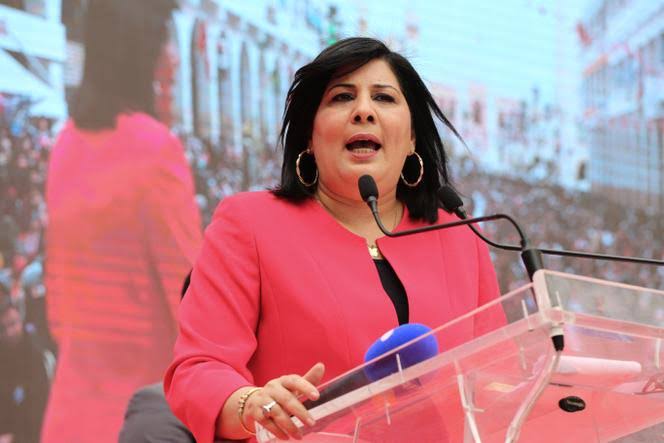A Tunisian court has sentenced vocal opposition leader Abir Moussi to two years in prison, escalating political tensions in the North African country.
The judgment, handed down Thursday, June 12, 2025, punishes Moussi for criticizing Tunisia’s electoral commission.
Her lawyer disclosed the sentence to Reuters shortly after the court ruling.
Moussi heads the Free Constitutional Party and is widely regarded as one of President Kais Saied’s most outspoken critics.
She was arrested in 2023 at the gates of the presidential palace.
Authorities accused her of attempting to stir unrest through alleged assault.
The arrest drew sharp criticism from civil society groups and foreign observers, who warned of growing authoritarianism under President Saied.
Moussi has remained behind bars since her arrest last year.
She now faces two more years in detention for allegedly undermining a state institution.
Supporters of Moussi view her incarceration as politically motivated.
They argue that President Saied is targeting prominent opposition figures to stifle dissent.
Human rights organizations have raised alarms about the shrinking space for free speech in Tunisia.
They accuse the government of weaponizing the judiciary to silence opposition voices.
Since Saied’s power grab in 2021, Tunisia has seen a steady erosion of democratic freedoms.
He dissolved parliament, rewrote the constitution, and now governs by decree.
Critics call it a coup against Tunisia’s 2011 democratic gains following the Arab Spring.
Moussi’s party, known for its anti-Islamist stance and secular ideology, had emerged as a major challenger to Saied’s dominance.
Her jailing further weakens institutional checks on the presidency.
Political analysts say the move sends a chilling message to other opposition leaders.
Saied’s allies defend the court’s decision, insisting it was based on legal grounds, not political revenge.
But many Tunisians fear that justice is now tied to loyalty, not the law.
Tunis streets have seen periodic protests demanding Moussi’s release and the restoration of civil liberties.
International watchdogs are urging the Tunisian government to guarantee judicial independence and protect political freedoms.
Despite the sentencing, Moussi’s supporters vow to continue resisting what they call a dictatorship in disguise.
Tunisia, once a symbol of Arab democratic hope, now teeters on the brink of authoritarian regression.
The two-year sentence adds to growing concerns over the rule of law and democratic backsliding in the country.







